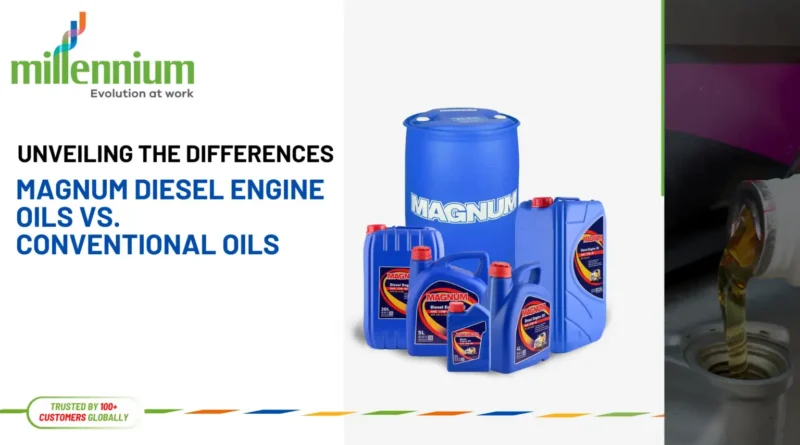Magnum Diesel Engine Oils vs. Conventional Oils
When it comes to maintaining the performance and longevity of diesel engines, the choice of engine oil plays a critical role. With advancements in automotive technology, oils have evolved significantly, offering a range of options tailored to specific needs. This article delves into the differences between Magnum Diesel Engine Oils and conventional oils, highlighting their features, benefits, and the factors one should consider when making a choice.
MAGNUM Diesel Engine Oils: Features and Benefits
Magnum Diesel Engine Oils are formulated specifically to meet the rigorous demands of modern diesel engines. These oils are designed to provide superior protection and performance under extreme conditions. Here are some key features and benefits:
- Enhanced Viscosity Stability: Magnum oils maintain optimal viscosity over a wide range of temperatures, ensuring consistent performance and protection in both hot and cold climates.
- Advanced Additive Technology: They contain high-quality additives that help in reducing wear and tear, minimizing deposits, and protecting against corrosion. This ensures the engine runs smoothly and efficiently.
- Superior Oxidation Resistance: Magnum oils resist oxidation better than conventional oils, which helps in maintaining oil integrity and performance over longer periods.
- Improved Fuel Efficiency: These oils are designed to enhance fuel economy by reducing friction and improving engine efficiency.
- Extended Drain Intervals: Due to their robust formulation, Magnum Diesel Engine Oils offer longer oil change intervals, reducing maintenance costs and downtime.
- Environmental Protection: With lower emissions and better fuel efficiency, Magnum oils contribute to a cleaner environment.
Conventional Oils: Pros and Cons
Conventional oils, often referred to as mineral oils, are derived directly from crude oil and have been the standard for many years. While they are still widely used, they come with their own set of advantages and disadvantages:
Pros:
- Cost-Effective: Conventional oils are generally less expensive than synthetic or specialized oils like Magnum Diesel Engine Oils.
- Widely Available: They are readily available and can be found in most auto parts stores and service stations.
- Sufficient for Older Engines: For older engines that don’t require the advanced properties of synthetic oils, conventional oils can be more than adequate.
Cons:
- Less Stability: Conventional oils tend to break down more quickly under high temperatures, leading to more frequent oil changes.
- Inferior Performance: They generally lack the advanced additives that provide enhanced protection against wear, deposits, and corrosion.
- Shorter Lifespan: Due to quicker degradation, conventional oils need to be changed more frequently, increasing maintenance costs and environmental waste.
Comparison: MAGNUM Diesel Engine Oils vs. Conventional Oils
When comparing Magnum Diesel Engine Oils to conventional oils, several critical factors emerge:
- Performance: Magnum oils outperform conventional oils in extreme conditions, providing better protection and efficiency. Conventional oils may suffice for less demanding applications but fall short under rigorous use.
- Durability: The advanced formulation of Magnum oils offers longer service intervals, whereas conventional oils require more frequent changes.
- Cost: While Magnum oils are more expensive upfront, their extended intervals and superior protection can lead to cost savings over time by reducing engine wear and maintenance needs.
- Environmental Impact: Magnum oils contribute to lower emissions and better fuel efficiency, aligning with modern environmental standards, unlike conventional oils which may result in higher emissions.
Factors to Consider For MAGNUM Diesel Engine Oils Vs. Conventional Oils
When choosing between Magnum Diesel Engine Oils and conventional oils, consider the following factors:
- Engine Type and Age: Modern diesel engines, especially those with advanced features like turbocharging, benefit more from Magnum oils. Older engines might not require such high-performance oils.
- Operating Conditions: If the vehicle operates in extreme temperatures or under heavy loads, the stability and protection offered by Magnum oils are crucial.
- Maintenance Schedule: For those who prefer longer intervals between oil changes, Magnum oils are the better choice due to their longevity and durability.
- Budget: Initial cost considerations may favor conventional oils, but long-term savings from reduced maintenance and improved fuel efficiency can make Magnum oils more economical.
- Environmental Concerns: For environmentally conscious users, Magnum oils offer the advantage of lower emissions and better fuel economy.
Conclusion
Choosing the right engine oil is vital for the performance and longevity of diesel engines. Magnum Diesel Engine Oils provide superior protection, performance, and environmental benefits compared to conventional oils. While conventional oils remain a viable option for older engines and less demanding applications, the advanced formulation of Magnum oils makes them a worthwhile investment for modern diesel engines operating under challenging conditions. By considering factors such as engine type, operating conditions, maintenance schedules, budget, and environmental impact, users can make an informed decision that ensures optimal engine performance and longevity.

